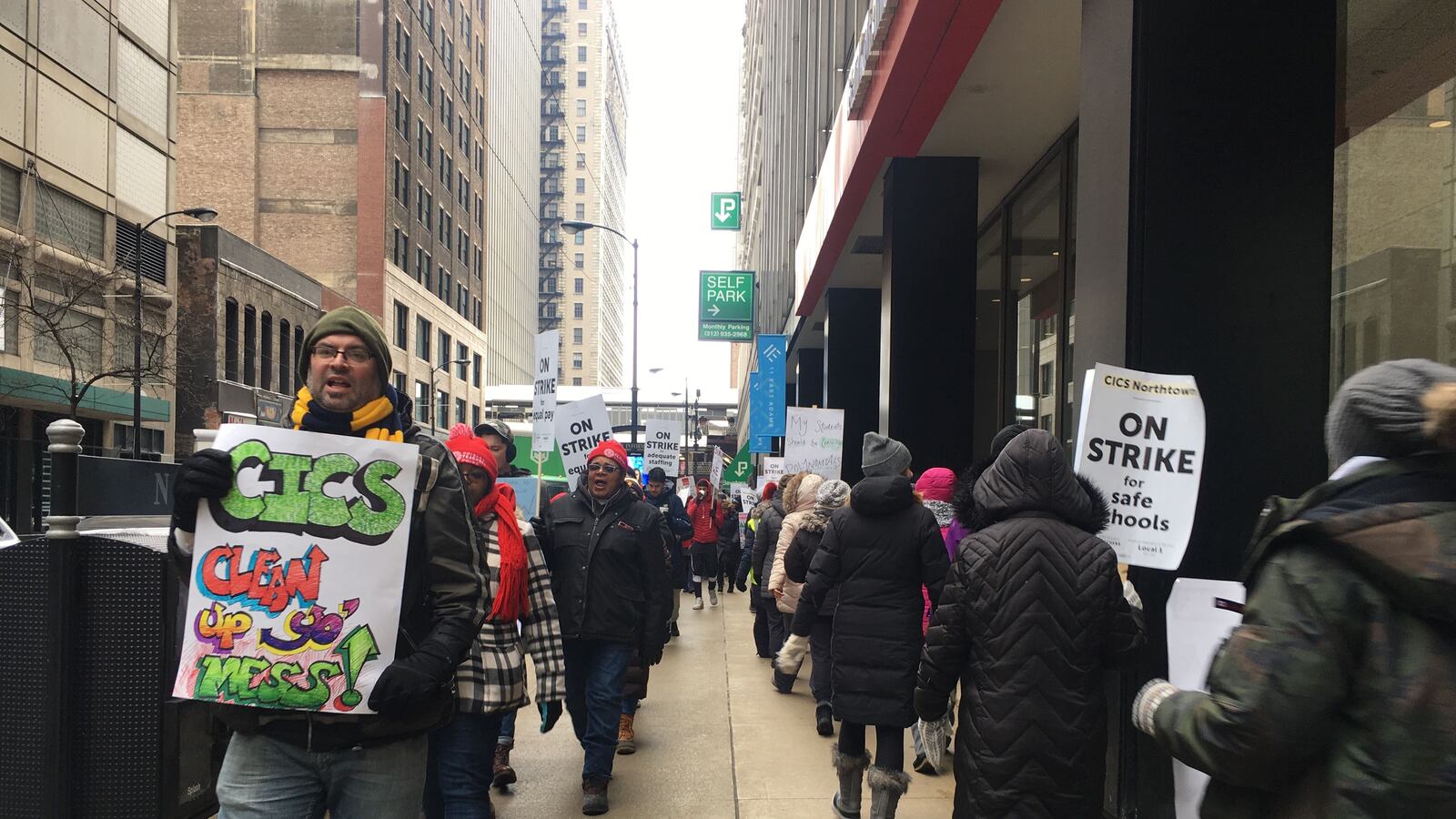As Denver teachers went out on strike Monday in a pay dispute with their district, charter teachers in Chicago at four schools operated by Civitas Education Partners entered the second week of a strike over wages and support services for students.
With negotiations failing again on Sunday night, teachers braved freezing temperatures to walk picket lines at the crack of dawn outside the downtown headquarters of Chicago International Charter Schools, Civitas’ parent company. They also staged an afternoon rally, focusing on the charter’s unusual management structure, and called for the network’s CEO to join them at the bargaining table.
The strike affects 180 teachers and paraprofessionals and about 2,200 students. Schools are open and staffed by non-union staff — 165 students attended class at CICS Wrightwood elementary on Monday, while no students came to CICS Northtown, according to Chicago International’s figures.
Here’s what you need to know as the strike heads into its second week:
What is the main sticking point in negotiations?
Pay remains a sticking point between the teachers’ union and Civitas Education Partners.
Teachers and support staff are demanding increased pay that rewards their education levels and experience, more counselors and social workers and smaller class sizes. They are also angry at recent changes in benefit structures, including no longer offering paid parental leave for staff.
Union officials said the network has offered teachers an 8 percent raise in the first year of the contract, but only if they agree to staffing cuts in some areas like counseling and social workers.
Management has said that the union has agreed to several points, including counselor ratios and class size. In response, Jen Conant, a CICS Northtown teacher and member of the bargaining team, accused the network of lying.
“CICS continues to demand that our educators trade small raises on already terrible wages for cuts to our students’ education needs,” Conant said. “We have no agreement on class sizes, which CICS wants to increase. We have no agreement on counselor ratios, which CICS also wants to increase.”
Who’s at the table?
At the negotiating table, 14 people represents the union, including teachers, paraprofessionals, the union’s general counsel, and field representatives from the striking schools.
On management’s side, Civitas officials negotiate, led by LeeAndra Khan, the company’s CEO.
But in recent days, the union has called for Civitas’ parent company, Chicago International Charter Schools, to join the talks.
“We want CICS to come to the table and negotiate with teachers,” said Stacey Davis Gates, political director of the Chicago Teachers Union.
Unlike charter networks that run schools directly, Chicago International operates more like a contractor: It hires other organizations to run schools. The network oversees 14 schools run by five charter management organizations, some of which subcontract management to a third operator.
Khan, of Civitas, has insisted that her company makes financial decisions and that Chicago International has no personnel function at striking schools. “CICS is not at the table because CICS is not the employer,” she said.
Why is this strike significant?
This is the third charter teachers strike in the country — the first took place when Acero teachers walked off the job in Chicago in December, and the second when educators in Los Angeles, including from three charter schools, walked off the job for eight days last month.
Bob Bruno, director of the Labor Education Program at the University of Illinois at Urbana-Champaign, said by winning some demands, CICS teachers could demonstrate that charter employees can stage — and win — strikes. Teachers in both Chicago’s Acero strike, and in Los Angeles, were able to get many of their demands.
“Maybe the first strike is unique,” said Bruno. But “if CTU [Chicago Teachers Union] is successful with the second one, then it affirms that this is a path that can be productive for teachers.”
Negotiations resumed at 5 p.m. Monday.

